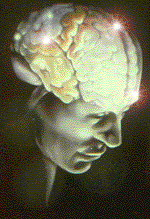John Locke's An Essay on Human Understanding delves into the difference of thought process between simple and complex ideas. The steps that each person takes to come to a precise thought. He mentions senses and other factors that would cause us to think a certain way. He also notes that the mind began as "white paper, void of all characters, without any ideas."
David Hume wrote another essay concerning human understanding called An Enquiry Concerning Human Understanding. In his essay, it focuses on cause & effect and how that applies to human thought processes.
When comparing and contrasting the two essays, it's clear to see that both have somewhat similar ideas of thought. Although Hume writes concerning human reason rather than a focus on ideas. How every person comes to a certain thought or idea is rather interesting.
In my AP Psychology class, the brain was a subject discussed in depth because every decision, action, natural instinct, and thought is from our brain. We discussed how certain triggers are the causes of our thoughts. If we want to get technical, thinking (or cognition) refers to all the mental activities associated with thinking, knowing, remembering, and communicating. We form concepts - mental groupings of similar objects, events, and people. Our brain does this automatically for us. Of course there is a lot more science behind thinking concerning certain brain structures and such but all we need to know is that the brain is very active all the time.
In Locke's essay, his second point to thought process is "the perception of the operation of our own minds." I read an interesting blog post by Dustin Wax that talks about how great ideas come to be and it follows closely to what Locke states. He states 5 things that come into play when trying to construct a great idea: preparation, attention, curiosity, effort, and wit. When you break those 5 down to their basis, they are all possible through sheer brain power.
Think on that!

You could apply all five of those things to getting better grades// getting a more thourough education too! lol. If I am really curious or interested in a class, prepare for it, pay attention, and give my best effort, I'll get more out of it. I like the last the best though: wit. I think that's what we're trying to do on our blogs in Digital Civ. Take what we learn, sort of apply it and sort of twist it and expand upon it.
ReplyDeleteI really enjoyed the blog you linked to by Dustin Wax. I thought it was most interesting how he brought up the point that sometimes the hardest part of being creative is actually executing the ideas you have.
ReplyDelete